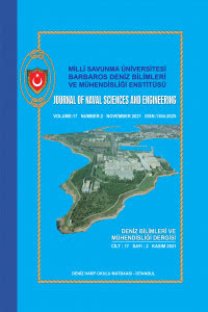FOREWORD
FOREWORD
The year 2023 represents a milestone for our country, our academy, and for our journal. The Republic of Türkiye will celebrate its centennial, the Turkish Naval Academy (TNA) will celebrate its quarter-millennial, and the Journal of Naval Sciences and Engineering (JNSE) will celebrate its vicennial in 2023. Undoubtedly, the historical intersection is a source of praise and pride for our academy and for our journal.Founded in 1773, the Imperial School of Naval Engineering (Mühendishane-i Bahr-i Hümâyûn), considered the first engineering school of the Empire, became the foundation of both the TNA and the Istanbul Technical University (ITU). TNA and ITU have special positions in terms of Turkish modernization history as the institutions where engineering and technical education have continued since the Ottoman period with their 249 years of distinguished history. 2023 will mark these exceptional institutions’ 250th anniversary.2023 will also mark the 20th anniversary of the JNSE. The journal, which has published 18 volumes and 36 issues under the ownership of the Naval Sciences and Engineering Institute since its first issue in 2003, has aimed to provide a scientific contribution to the theory and applications of naval sciences and engineering and share knowledge in relevant fields. As we are entering this historically significant year, by virtue of the restructuring of the Institutes affiliated with the National Defence University, the journal has been transferred from the Barbaros Naval Sciences and Engineering Institute to the ownership of the Turkish Naval Academy Deanery starting with this issue.As an Editorial Board Member of the JNSE since 2013, as well as an Editor in both 2018 and 2019, and as an Administrative Board Member of the Naval Sciences and Engineering Institute from 2013 to 2022, it has been encouraging to see JNSE’s continued improvement. The role of Editor-in-Chief (EIC) has been passed to me at a special time when our journal has been included within the scope of the ULAKBIM TR Index. The journal must, first and foremost, continue to provide a contribution to science and engineering in fields aligned with the areas of interest of the JNSE, e.g., electrical and electronics engineering, naval/mechanical engineering, naval architecture and marine engineering, industrial engineering, computer science and engineering, and basic/social sciences. In the meantime, we will do our best to make our journal ready to be a candidate to be indexed in Science Citation Indexes. Raising the quality of the accepted papers by introducing strict review criteria will be instrumental in achieving this goal by increasing the impact of the journal.To this end, we recently applied to join Crossref as a member under the sponsorship of TÜBİTAK ULAKBİM DergiPark, and consequently, we are entitled to provide a DOI (Digital Object Identifier) for the papers accepted after September 1, 2022. The editorial processes of the articles sent after the specified date are carried out by the new editorial board.With the new structure of JNSE’s Editorial Board, when a manuscript is submitted, the EIC assigns it to the appropriate Editorial Board Member based on the main topic area of the manuscript. The assigned Member should assign a minimum of two reviewers to evaluate the manuscript. He/she is expected to make his/her own independent review of the manuscript and, once the reviewers have completed their evaluation, he/she submits a recommendation to the EIC. The EIC checks for consistency among the recommendations, typically accepts the recommendation of the assigned Editorial Board Member and then communicates to the corresponding author the final decision together with the comments of the reviewers.We are therefore starting with a smaller, more flexible, and resourceful Editorial Board, dedicated to this purpose. I hope that with the other editors, we can push JNSE to a more competitive position within the field; a position that it rightly deserves.The success of any journal is built on the support of the contributors, the reviewers, the editors, and the publication staff. We look forward to receiving your ideas for making JNSE more valuable for our community. We welcome your original contributions to our issues that will be published in this historical year of 2023.Fatih ERDEN, PhDEditor-in-Chief
- ISSN: 1304-2025
- Yayın Aralığı: Yılda 2 Sayı
- Başlangıç: 2003
- Yayıncı: Milli Savunma Üniversitesi Deniz Harp Okulu Dekanlığı
Sayıdaki Diğer Makaleler
AN EVALUATION ON WEAPON TARGET ASSIGNMENT PROBLEM
Emre TÜKENMEZ, Emre GÜLHER, Özgür KAYA, H. Fatih POLAT
AKIŞ DÜZENLEYİCİLERİN BİR JENERİK DENİZALTI YELKENİ ETRAFINDAKİ AKIŞA ETKİSİNİN İNCELENMESİ
Gökay SEVGİ, Barış BARLAS, Oral ÜNAL
CPM VE PERT YÖNTEMLERİYLE PROJE PLANLAMA: SAVUNMA SANAYİ ÖRNEĞİ
MECHANICAL GYROSCOPE-BASED ROLL MOTION REDUCTION OF MARINE VEHICLES: AN EDUCATIONAL SETUP
A NEW RECEIVER DESIGN FOR SPATIAL MODULATION SYSTEMS
THE EFFECT OF FOV ANGLE ON A RSSI-BASED VISIBLE LIGHT POSITIONING SYSTEM
